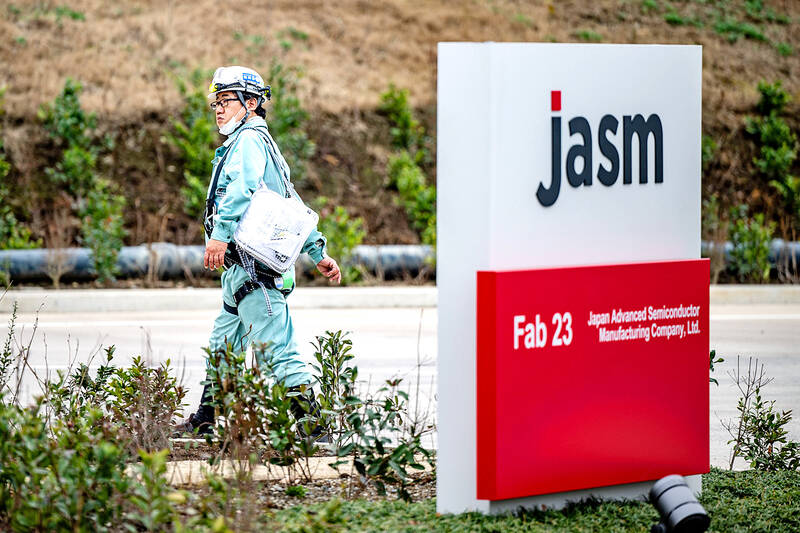Taiwan Semiconductor Manufacturing Co (TSMC, 台積電) yesterday obtained the government’s approval to inject an additional US$10.26 billion to finance the construction of its second fab in Kumamoto, Japan, and a second fab in Arizona, using advanced process technologies.
The Department of Investment Review approved TSMC’s investment applications on the basis that Taiwan remains a major technology and manufacturing hub for the chipmaker, which makes its most advanced chips at home, the company operates its research-and-development center here and the majority of its capacity remains in Taiwan.
The latest capital injections — US$5.26 billion for its Japanese venture Japan Advanced Semiconductor Manufacturing Inc and US$5 billion for TSMC Arizona Corp — would help the chipmaker deepen its partnerships with local supply chains and recruitment of skillful talent, the department said in a statement.

Photo: AFP
That would help safeguard the nation’s semiconductor industry’s competitiveness in the long term, the statement said.
TSMC’s second Arizona fab is to upgrade its process technology to 2 nanometers to support customers’ strong demand for artificial intelligence (AI) in addition to 3-nanometer technology, the world’s biggest contract chipmaker told investors in April.
The new Arizona fab is to enter volume production in 2028, about three years after the first Arizona fab ramps up production in the first half of next year, which was pushed back from an earlier schedule of late this year due to a lack of sufficient technicians and skilled workers.
The second Kumamoto fab is designed to produce chips from 6-nanometer to 40-nanometers used in automotive, industrial and high-performance-computing applications, TSMC said.
The construction is to start in the second half of this year, with volume production targeted by the end of 2027, it said.
The first fab in Kumamoto is to enter volume production of 12-nanometer, 16-nanometer, 22-nanometer and 28-nanometer chips in the fourth quarter of this year as scheduled, the chipmaker said.
Wire and cable maker Walsin Lihwa Corp (華新麗華) yesterday also won approval to invest US$160 million in its fully owned subsidiary in Singapore, Walsin Singapore Pte Ltd.
The department yesterday also gave the go-ahead to electronic components supplier Lite-On Technology Corp’s US$89.38 million plan to acquire equities of Japan’s Cosel Co (光寶科技), a producer of power supplies and noise filters.
The investment would allow Lite-On to indirectly own Cosel’s four Chinese units, the department said.

Real estate agent and property developer JSL Construction & Development Co (愛山林) led the average compensation rankings among companies listed on the Taiwan Stock Exchange (TWSE) last year, while contract chipmaker Taiwan Semiconductor Manufacturing Co (TSMC, 台積電) finished 14th. JSL Construction paid its employees total average compensation of NT$4.78 million (US$159,701), down 13.5 percent from a year earlier, but still ahead of the most profitable listed tech giants, including TSMC, TWSE data showed. Last year, the average compensation (which includes salary, overtime, bonuses and allowances) paid by TSMC rose 21.6 percent to reach about NT$3.33 million, lifting its ranking by 10 notches

Popular vape brands such as Geek Bar might get more expensive in the US — if you can find them at all. Shipments of vapes from China to the US ground to a near halt last month from a year ago, official data showed, hit by US President Donald Trump’s tariffs and a crackdown on unauthorized e-cigarettes in the world’s biggest market for smoking alternatives. That includes Geek Bar, a brand of flavored vapes that is not authorized to sell in the US, but which had been widely available due to porous import controls. One retailer, who asked not to be named, because

SEASONAL WEAKNESS: The combined revenue of the top 10 foundries fell 5.4%, but rush orders and China’s subsidies partially offset slowing demand Taiwan Semiconductor Manufacturing Co (TSMC, 台積電) further solidified its dominance in the global wafer foundry business in the first quarter of this year, remaining far ahead of its closest rival, Samsung Electronics Co, TrendForce Corp (集邦科技) said yesterday. TSMC posted US$25.52 billion in sales in the January-to-March period, down 5 percent from the previous quarter, but its market share rose from 67.1 percent the previous quarter to 67.6 percent, TrendForce said in a report. While smartphone-related wafer shipments declined in the first quarter due to seasonal factors, solid demand for artificial intelligence (AI) and high-performance computing (HPC) devices and urgent TV-related orders

Prices of gasoline and diesel products at domestic fuel stations are this week to rise NT$0.2 and NT$0.3 per liter respectively, after international crude oil prices increased last week, CPC Corp, Taiwan (台灣中油) and Formosa Petrochemical Corp (台塑石化) said yesterday. International crude oil prices last week snapped a two-week losing streak as the geopolitical situation between Russia and Ukraine turned increasingly tense, CPC said in a statement. News that some oil production facilities in Alberta, Canada, were shut down due to wildfires and that US-Iran nuclear talks made no progress also helped push oil prices to a significant weekly gain, Formosa said